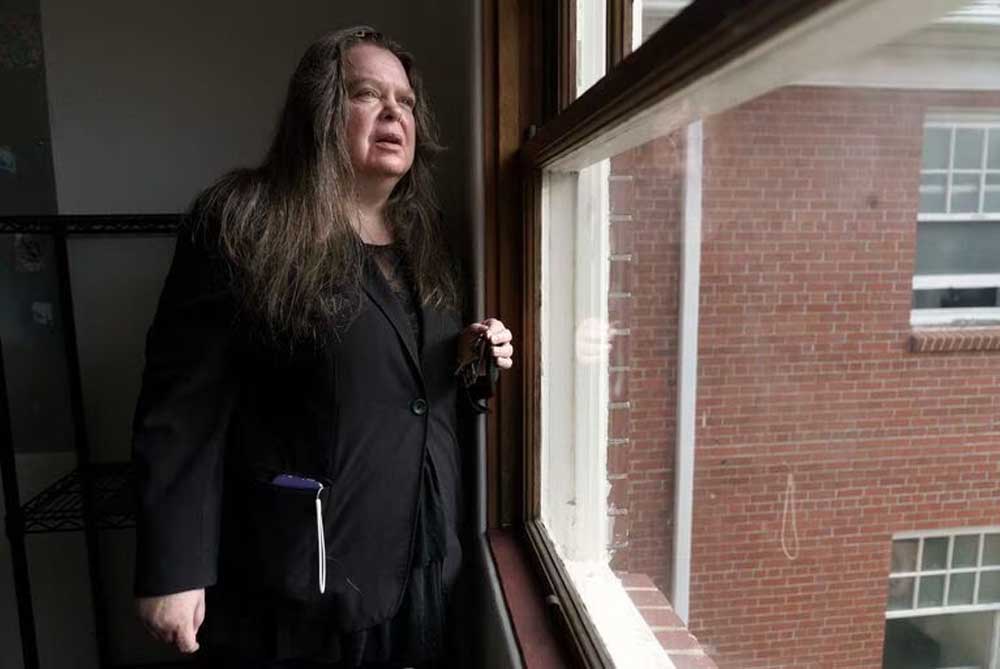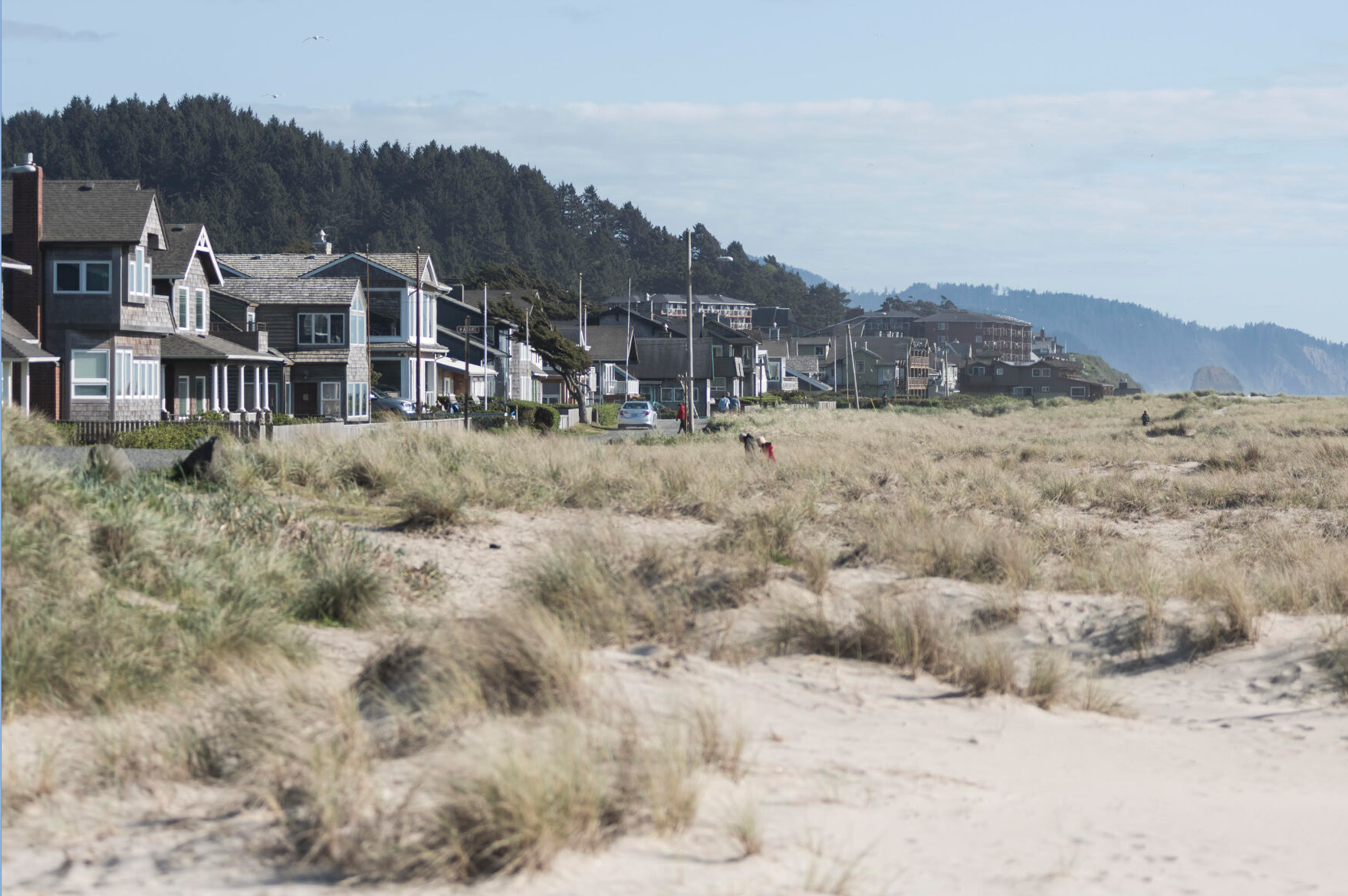An affordable housing lesson in Portland’s Milepost 5
Published 12:04 pm Tuesday, February 21, 2023

- Amber Cook, at Milepost 5 in Portland. Cook has lived at the affordable housing complex created for artists for five years, but says the condition of the building has deteriorated following a change in ownership.
Amber Cook couldn’t have been more thrilled to move into an apartment at Portland’s Milepost 5 in 2018.
Trending
The affordable housing complex for artists in the Montavilla neighborhood appeared to fit the bill.
Five years later, Milepost 5 sits almost half vacant, with several of its apartments home to squatters. Maintenance requests go unanswered, leaving windows cracked, door locks broken, trash overflowing and communal bathrooms uncleaned for months at a time. The artist studio that renters are promised access to as part of their rent has been shuttered behind a deadbolt for a year.
So, Cook is taking the management company to court. In January, she signed on as the lead plaintiff in a lawsuit against Guardian Management, the property management company responsible for running Milepost 5. The lawsuit accuses Guardian of failing to maintain a habitable dwelling, as required under Oregon law. The plaintiffs ask that Guardian return rent paid by all tenants who’ve lived at Milepost 5 within the past year, and demand a jury trial.
Trending
The lawsuit exemplifies how far Milepost 5 has fallen since the doors opened in 2010. It also offers a cautionary tale to local and state governments, as leaders look to address the region’s homelessness crisis by rapidly expanding affordable housing programs.
It started with a vision
Milepost 5 was a pet project of former mayor Sam Adams, meant to solve the burgeoning problem of Portland’s creative class being priced out of the city.
The former Baptist nursing home on Northeast 82nd Avenue was originally purchased and converted into a dorm-like residence in 2007 by Beam Development in partnership with an affordable housing trust. By 2010, Milepost 5 had secured a $250,000 investment from the city and began moving in tenants.
Former tenant Evan Wellington recalls the early days of Milepost 5, when Adams would stop by tenant art shows on the complex’s ground floor with monied art patrons. For several years, Wellington said, the dream of Milepost 5 was a reality.
In 2018, Beam sold the property to a California investment company called Community Development Partners.
Piling neglect
Milepost 5′s apartments are reserved for low-income tenants, with rents determined by income level.
The relatively low cost of Milepost 5 rent goes beyond the price of a room – it also covers cleaning services in the building’s communal areas like the shared kitchens, bathrooms and studio spaces. Tenants say those janitorial services stopped in mid-2020, not long after the COVID-19 pandemic set in.
This neglected maintenance quickly made Milepost 5 a destination for unhoused people in the neighborhood who, according to tenants, began relying on the building’s communal spaces for warm showers and kitchen space. Tenants said several people broke into vacant units and took up permanent residence.
While tenants say they’ve witnessed visitors selling illegal drugs in common areas and threatening renters in the halls, they struggle to get anyone to take action.
“Police always tell us the same thing,” said Sarah Gerhardt, who has lived in Milepost 5 since 2021. “They say that, unless the owner of the building tells the police that those people are excluded from being there, there is nothing they can do.”
When tenants report the squatters to Guardian and Community Development Partners, Cook said, they’re essentially told that “it’s really hard” to legally remove them.
Hollie Forsman, vice president of property operations for Guardian, expanded on this response in an interview with Oregon Public Broadcasting.
“If you call the Portland police and say someone has trespassed on your property, no one (from the police bureau) comes,” Forsman said. “They are prioritizing elsewhere, I guess.”
Kevin Allen, a spokesperson for the Portland Police Bureau, rejected this assumption. Allen said that officers have responded to 911 calls at Milepost 5 “many times,” but it’s common for officers to take a little longer to respond to the types of calls originating from that property.
Allen said the bureau’s East Precinct Neighborhood Response Team has been focused on addressing crime in and around Milepost 5 for a while, whether that means expanding police patrols in the neighborhood or meeting with residents directly to help problem-solve ongoing issues. They also coordinate with Echelon Protective Services, a private security team Community Development Partners hired to monitor the complex 11 hours every day. Yet, Allen said, officers remained limited by laws and resources when it comes to resolving criminal issues on site.
In mid-January, one communal bathroom was permanently locked to tenants, with no explanation.
The building’s outdoor areas – including several patio spaces, a grassy courtyard and raised garden beds – were littered with garbage and overgrown with weeds.
After inaction by management, tenants began contacting Oregon Housing and Community Services, the state agency responsible for making sure Community Development Partners meets the requirements of a low-income housing provider.
Tenants say that the state agency regularly defers to Community Development Partners and Guardian’s claims that there are no maintenance problems, making tenants feel dismissed. Emails obtained by a Milepost 5 neighbor through a public records request illustrate this trend.
In May 2022, an Oregon Housing and Community Services compliance manager received a report about exposed asbestos in Milepost 5′s attic, a space management uses for storage and is often broken into by squatters, and forwarded the concern to Guardian manager Kayla Jamieson. In response, Jamieson denied that the public had access to the attic and added that she didn’t recognize the photos of the exposed asbestos attached to the complaint. That was enough to convince the compliance manager to close the complaint.
“We feel abandoned,” Cook said. “By the state, by the property owners, by the city, by the community. No one’s looking out for us.”
In an email to Oregon Public Broadcasting, Oregon Housing and Community Services spokesperson Delia Hernández explained that the sheer amount of concerns the state agency has been alerted to regarding Milepost 5 is uncommon.
“As the agency has a limited role with the affordable housing communities it funds, for the most part, tenant concerns are sent to the property owners and managers,” Hernández wrote.
Oregon Housing and Community Services is required to conduct physical site inspections of affordable housing it helps fund every three years. Due to the urgency of the concerns raised at Milepost 5, Hernández said the agency moved up that timeline to conduct a “more extensive review” recently.
The threat of the state agency’s inspection was felt across the apartment complex. Cook believes the inspection, which took place in late January, prompted Guardian to make some hasty maintenance fixes in anticipation. A week before the site visit, Cook said workers affixed keypads to two of four communal bathroom doors to keep trespassers out, repaired long-broken windows and stuck security cameras in the complex’s hallways, without any warning to tenants.
She said she appreciated the small updates, but lamented that tenants only see improvements when government authorities threaten a visit .
The results of Oregon Housing and Community Services’ inspection will be shared with the property owner and management company and not be made public, according to Hernández.
Proper property upkeep
Guardian’s Forsman refutes the accusations of neglect laid out in the lawsuit. She says that a janitorial service cleans Milepost 5′s communal areas for six hours each day and that broken doors, windows and other building fixtures are always repaired within a day.
“With any apartment community, management handles things as things happen,” said Forsman. “Milepost 5 is not unique. Every single day we do what is right by our residents.”
Property owners Community Development Partners declined to be interviewed by Oregon Public Broadcasting for this story. But a Community Development Partners spokesperson forwarded a statement written by the company’s CEO, Eric Paine, explaining that, “If residents raise concerns, we are committed to finding solutions right away.”
Tenants vs. management
The lawsuit intends to represent all Milepost 5 tenants who have lived at the complex within the past year. The case specifically centers on Guardian’s neglect of the building’s shared living spaces, like the bathrooms, kitchens and community rooms.
Attorney Emily Templeton, who is representing the tenants, has experience fighting for renters’ rights in court. But she said this case stands out from past complaints for the sheer number of tenants impacted by the management company’s negligence.
“It’s not just in-unit violations we’re talking about,” Templeton said. “This impacts anyone in the building, which is why it was primed to be a class action case.”
Guardian has yet to respond to the initial legal complaint. On Feb. 7, Templeton’s office was notified that prominent trial attorney John DiLorenzo would be representing Guardian. DiLorenzo is known for using the courts to pursue local policy changes, like improving oversight on how the city’s water bureau uses taxpayer dollars or – more recently – pushing the city to enforce a sidewalk camping ban to adhere to the Americans with Disability Act.
His appointment could signal Guardian’s interest in using the case to establish a larger change in the standards property management companies must meet when overseeing low-income housing complexes. Whatever precedent this case sets, it has the potential to impact a new batch of affordable housing programs cropping up across the region: Both Gov. Tina Kotek and Multnomah County Chair Jessica Vega Pederson have committed millions in the past month to developing new housing for low-income tenants at risk of homelessness.
“The more you learn about affordable housing, the more you realize it’s not about providing affordable housing for renters, it’s about making housing affordable for developers,” Cook said. “I can only hope our situation makes that clear.”
According to state records from 2022, Guardian manages and owns at least 38 different affordable housing apartment complexes that rely on government subsidies across Oregon. Community Development Partners owns seven.









